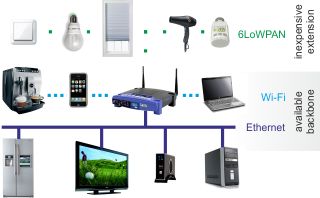|
Californium: A CoAP Framework in Java (L)Status: AbgeschlossenBackgroundThe Internet of Things is the idea of interconnecting everyday objects and ideally we do this within the largest interconnected network we have, the Internet. A benefit is that we will be able to easily and remotely access information about our things and their environment (e.g., the status of the washing machine in the basement or the occupancy of a room). The same way, we will control actuators (e.g., lock the door or turn on the auxiliary heating of the car parked outside). With this information and control available, new applications will emerge that increase quality of life and energy efficiency. 
If we also apply the vision of the Web of Things initiative, users could discover and configure their things conveniently with a tool already integrated into their daily lives, the Web browser. Automation and even more sophisticated applications would be realized in a Web 2.0 manner, i.e. by simple scripting and creating mashups. All appliances would have a Web-frontend to access their resources and functions that can be combined with services from the Internet. We envision smart appliances to be a significant share of the Internet of Things. They will be able to communicate, export their UI, and provide an open API to all their information and functionalities such as the remaining run time of your washing machine, the performance at your home trainer, the light sensor of your TV, or control of your lights and heating. A smart freezer for instance could activates its aggregate at the right time, when green energy from solar or wind power plants is available and cheap. A key challenge still is to connect constrained embedded devices, as we would find them in smart appliances, at the application layer. While Web servers on these devices or application-level gateways for proprietary device protocols are possibile, these current solutions lack efficiency and openness, respectively. Using an emerging IETF standard, the Constrained Application Protocol (CoAP), we will prototype smart appliances that are directly accessable over an open, RESTful Web protocol. ObjectivesThe goal of this lab is to design an application framework in Java that provides a CoAP library and simplifying API to develop applications for smart appliances such as a smart thermostat control system. A detailed work plan can be found in the Project Wiki. Requirements
Contact/Ansprechpartner: Matthias Kovatsch |
|
|